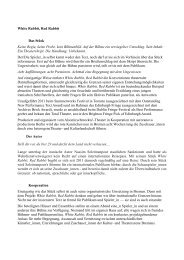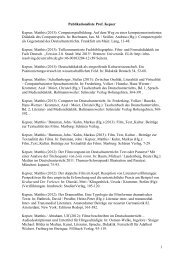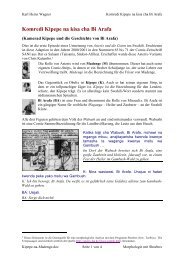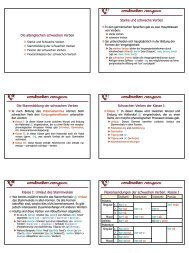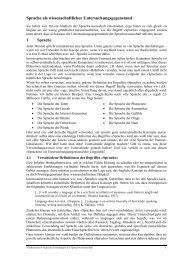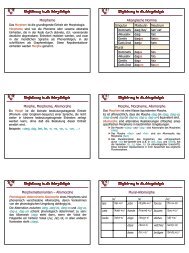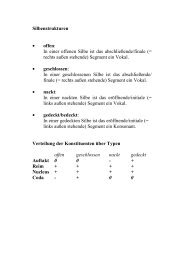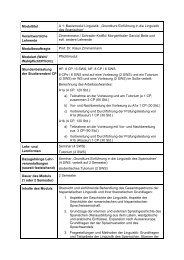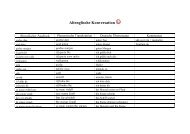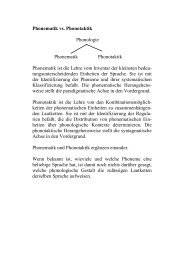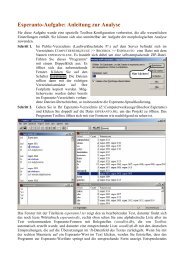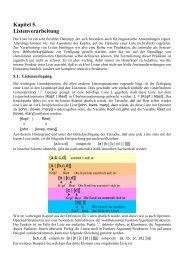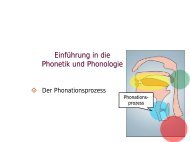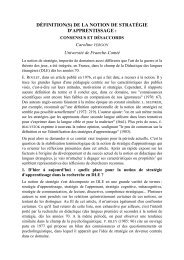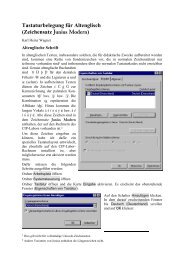Relativism and Universalism in Linguistics - Fachbereich 10 ...
Relativism and Universalism in Linguistics - Fachbereich 10 ...
Relativism and Universalism in Linguistics - Fachbereich 10 ...
Create successful ePaper yourself
Turn your PDF publications into a flip-book with our unique Google optimized e-Paper software.
162 Workshops<br />
rather <strong>in</strong>tricate system of mood mark<strong>in</strong>g is generally associated with the cod<strong>in</strong>g of <strong>in</strong>direct<br />
speech (descriptions of this system can be found <strong>in</strong> the Dudengrammar or the IDS-grammar).<br />
This is, however, only part of the story, as the render<strong>in</strong>g of direct speech <strong>in</strong> a less direct way<br />
can take up many forms, some of which are more grammatical(ized) than others.<br />
In my talk, I want to focus on the distribution <strong>and</strong> mean<strong>in</strong>g of both mood <strong>and</strong> modal verbs<br />
from a contrastive po<strong>in</strong>t of view. More specifically, I want to look at <strong>in</strong>direct speech<br />
phenomena <strong>in</strong> German <strong>and</strong> Dutch. As only relicts of the orig<strong>in</strong>al Dutch mood system can be<br />
found <strong>in</strong> present-day Dutch, mood dist<strong>in</strong>ctions are generally not used to mark <strong>in</strong>direct speech,<br />
at least not <strong>in</strong> the same way as <strong>in</strong> German. A somewhat hybrid status can be claimed to exist<br />
for zou, however, which – follow<strong>in</strong>g De Haan (2000), is a subjunctive form express<strong>in</strong>g<br />
“<strong>in</strong>direct evidentiality”. More specifically, De Haan claims that zou, just like the present<br />
conjunctive <strong>in</strong> German, expresses unconfirmed events, whereas modals like German sollen<br />
<strong>and</strong> Dutch moeten are purely evidential, <strong>in</strong> that their function consists <strong>in</strong> show<strong>in</strong>g “that the<br />
speaker has only <strong>in</strong>direct evidence for his or her statement”. An alternative position would be<br />
to view Dutch zou <strong>in</strong> its evidential use as the cognate of German sollen – what it shares with<br />
sollen is, for one th<strong>in</strong>g, a clear preference for ma<strong>in</strong>-clause use. Other elements to be<br />
considered <strong>in</strong> this respect are the extent to which the <strong>in</strong>formation is presented from the po<strong>in</strong>t<br />
of view of the report<strong>in</strong>g speaker (or the report<strong>in</strong>g speaker, see e.g. ten Cate 1996) <strong>and</strong> the<br />
extent to which the source of <strong>in</strong>formation is explicitly presented with both sollen <strong>and</strong> zou.<br />
With German sollen, the source of <strong>in</strong>formation can be mentioned, but is usually absent; the<br />
situation of zou is unclear <strong>in</strong> this respect.<br />
Corpus analysis of German <strong>and</strong> Dutch data (the corpus be<strong>in</strong>g restricted to journalistic prose)<br />
will reveal to what extent De Haan’s observations perta<strong>in</strong>.<br />
References<br />
ten Cate, Abraham P (1996): “Modality of verb forms <strong>in</strong> German reported speech”. In:<br />
Janssen, Theo A.J.M & Wim van der Wurff (eds.). Reported Speech: Forms <strong>and</strong><br />
Functions of the Verb. Amsterdam/Philadelphia, John Benjam<strong>in</strong>s. 189 - 211.<br />
De Haan, Ferd<strong>in</strong><strong>and</strong> (2000): “The Relation between Modality <strong>and</strong> Evidentiality” L<strong>in</strong>guistische<br />
Berichte. Sonderheft 00/2000.<br />
Willett, Thomas(1988): “A cross-l<strong>in</strong>guistic survey of the grammaticization of evidentiality”.<br />
Studies <strong>in</strong> Language 12:1. 51 - 97.<br />
The evidential space:<br />
A conceptual analysis<br />
Nuyts, Jan<br />
University of Antwerp<br />
jan.nuyts@ua.ac.be<br />
This paper will offer a ‘conceptual analysis’ of the status of evidentiality <strong>in</strong> the system of<br />
‘tense-aspect-modality’ categories or ‘qualificational’ categories more <strong>in</strong> general, with special<br />
focus on its relation to the modal categories, <strong>and</strong> most specifically to epistemic modality. It<br />
will wonder whether evidentiality should really be treated as one coherent category, <strong>and</strong><br />
whether it should not rather be dissolved <strong>and</strong> split <strong>in</strong>to a number of <strong>in</strong>dependent<br />
subcategories, each with quite different semantic properties (e.g. presence or absence of a<br />
scale, effects of/on speaker commitment), <strong>and</strong> with a quite different conceptual status, viz. (at<br />
least) the categories of <strong>in</strong>ferentiality, reason<strong>in</strong>g <strong>and</strong> related notions (which possibly belong<br />
under the umbrella of the ‘attitud<strong>in</strong>al categories’ quite like, among others, epistemic modality<br />
– even if they should not be <strong>in</strong>cluded <strong>in</strong> or jo<strong>in</strong>ed with the latter: they share several properties<br />
with epistemic modality, but are nevertheless semantically dist<strong>in</strong>ct), of hearsay, <strong>and</strong> of



